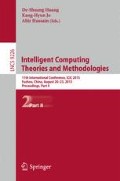Abstract
Efficiency and effectiveness are two important metrics for the evaluation of evolutionary algorithms (EAs). Firstly, there exist a number of efficiency metrics in EA, such as population size, number of termination generation, space complexity, and time complexity and so on. But the relationship of these metrics is left untouched. And evaluating or comparing EAs with one of these metrics or using them separately is unfair. Therefore it is necessary to consider their relationship and give proper metrics combination. We conclude that the product of population size and number of generation should be less than the value of search space size, and the product of time complexity and space complexity should also be less than a constant. Secondly, we study the relationship between efficiency and effectiveness. Based on these two metrics, we conclude that not only EAs can be compared, but also problems hardness can be measured. The results reveal important insights of EAs and problems hardness.
Access this chapter
Tax calculation will be finalised at checkout
Purchases are for personal use only
References
Yang, X.-S.: Nature-Inspired Optimization Algorithms. Elsevier, Oxford (2014)
Malan, K.M., Engelbrecht, A.P.: Ruggedness, funnels and gradients in fitness landscapes and the effect on PSO performance. Paper presented at the 2013 IEEE Congress on Evolutionary Computation (CEC), 20–23 Jun 2013
Xin, B., Chen, J., Pan, F.: Problem difficulty analysis for particle swarm optimization: deception and modality. In: Proceedings of the First ACM/SIGEVO Summit on Genetic and Evolutionary Computation, Shanghai, China, pp. 629–630 (2009)
Gras, R.: How efficient are genetic algorithms to solve high epistasis deceptive problems? Paper presented at the IEEE World Congress on Computational Intelligence, 1–6 Jun 2008
Smith-Miles, K., Lopes, L.: Measuring instance difficulty for combinatorial optimization problems. Comput. Oper. Res. 39(5), 875–889 (2012). Elsevier B.V
Malan, K.M., Engelbrecht, A.P.: A survey of techniques for characterising fitness landscapes and some possible ways forward. Inf. Sci. 241, 148–163 (2013). doi:10.1016/j.ins.2013.04.015
Jin, Y., Sendhoff, B.: Trade-off between performance and robustness: an evolutionary multiobjective approach. In: Fonseca, C.M., Fleming, P.J., Zitzler, E., Deb, K., Thiele, L. (eds.) EMO 2003. LNCS, vol. 2632, pp. 237–251. Springer, Heidelberg (2003)
Deb, K., Jain, S.: Running performance metrics for evolutionary multi-objective optimizations. Paper presented at the Proceedings of the Fourth Asia-Pacific Conference on Simulated Evolution and Learning (SEAL 2002), Singapore (2002)
Merz, P.: Advanced fitness landscape analysis and the performance of memetic algorithms. Evol. Comput. 12(3), 303–325 (2004). doi:10.1162/1063656041774956
Lu, C.-C., Yu, V.F.: Data envelopment analysis for evaluating the efficiency of genetic algorithms on solving the vehicle routing problem with soft time windows. Comput. Ind. Eng. 63(2), 520–529 (2012). doi:10.1016/j.cie.2012.04.005
Jin, Y.: Surrogate-assisted evolutionary computation: recent advances and future challenges. Swarm Evol. Comput. 1(2), 61–70 (2011)
Cooper, J., Hinde, C.: Improving genetic algorithms’ efficiency using intelligent fitness functions. In: Chung, P.H., Hinde, C., Ali, M. (eds.) IEA/AIE 2003. LNCS, vol. 2718, pp. 636–643. Springer, Heidelberg (2003)
Sastry, K., Goldberg, D.E., Pelikan, M.: Efficiency enhancement of probabilistic model building genetic algorithms. In: Illinois Genetic Algorithms Laboratory (2004)
Sastry, K., Pelikan, M., Goldberg, D.: Efficiency enhancement of estimation of distribution algorithms. In: Pelikan, M., Sastry, K., CantúPaz, E. (eds.) Scalable Optimization via Probabilistic Modeling. Studies in Computational Intelligence, vol. 33, pp. 161–185. Springer, Heidelberg (2006)
Tvrdík, J., Misik, L., Krivy, I.: Competing heuristics in evolutionary algorithms. In: Intelligent Technologies-Theory and Applications, pp. 159–165 (2002)
Beyer, H.-G., Schwefel, H.-P., Wegener, I.: How to analyse evolutionary algorithms. Theoret. Comput. Sci. 287(1), 101–130 (2002). doi:10.1016/S0304-3975(02)00137-8
Acknowledgement
This work is supported by the National Natural Science Foundation of China under Grant No. 61305149, 61403174, by Jiangsu Provincial Natural Science Foundation under Grant No. BK20131130, by China Ministry of Education, Humanities and Social Sciences Youth Foundation under Grant No. 11YJC630074 and by Jiangsu Overseas Research & Training Program for University Prominent Young & Middle-aged Teachers and Presidents.
Author information
Authors and Affiliations
Corresponding author
Editor information
Editors and Affiliations
Rights and permissions
Copyright information
© 2015 Springer International Publishing Switzerland
About this paper
Cite this paper
Hao, GS., Chen, CS., Wang, GG., Huang, YQ., Zhou, DX., Zhang, ZJ. (2015). Efficiency and Effectiveness Metrics in Evolutionary Algorithms and Their Application. In: Huang, DS., Jo, KH., Hussain, A. (eds) Intelligent Computing Theories and Methodologies. ICIC 2015. Lecture Notes in Computer Science(), vol 9226. Springer, Cham. https://doi.org/10.1007/978-3-319-22186-1_1
Download citation
DOI: https://doi.org/10.1007/978-3-319-22186-1_1
Published:
Publisher Name: Springer, Cham
Print ISBN: 978-3-319-22185-4
Online ISBN: 978-3-319-22186-1
eBook Packages: Computer ScienceComputer Science (R0)

